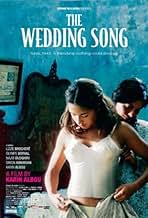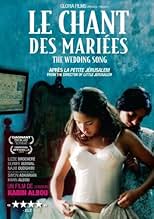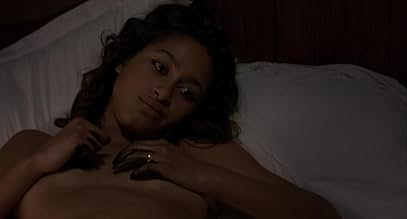IMDb-BEWERTUNG
6,6/10
907
IHRE BEWERTUNG
Die Besetzung Tunesiens durch die Nazis belastet die Freundschaft zwischen einer Muslimin und einer sephardischen Jüdin, die sich beide auf ihre Heirat vorbereiten.Die Besetzung Tunesiens durch die Nazis belastet die Freundschaft zwischen einer Muslimin und einer sephardischen Jüdin, die sich beide auf ihre Heirat vorbereiten.Die Besetzung Tunesiens durch die Nazis belastet die Freundschaft zwischen einer Muslimin und einer sephardischen Jüdin, die sich beide auf ihre Heirat vorbereiten.
- Auszeichnungen
- 1 Nominierung insgesamt
Empfohlene Bewertungen
Film africain bien sympa. Encore les nazis qui font des dégats et des abus, mais pas de massacres ici. Une histoire de copines juive et musulmane qui dévoile beaucoup des coutumes.
From the synopsis alone, The Wedding Song seems like a gut wrenching watch, that's what I thought at least. However Karin Albou has a good hand at crafting narratives without reverting to any cheap tropes to solely evoke emotion. Not that there isn't enough here to get all riled up about, it's just never done for the sake of sensationalism.
The story is laden with serious themes and undertones... race, religion, class, patriarchy, sexual rights - you name it and it's here. Yet the story is completely character driven, focusing wholly on the two girls and their struggles through the social and economical hardships which have been bestowed upon them.
Lizzie Brocheré and Olympe Borval steal every scene, their endearing friendship feels authentic and their suffering just makes you want to reach out a hand to help.
Although I didn't feel quite satisfied by the end credits, I was certainly engrossed in every scene and emersed in this story of far away and long ago.
The story is laden with serious themes and undertones... race, religion, class, patriarchy, sexual rights - you name it and it's here. Yet the story is completely character driven, focusing wholly on the two girls and their struggles through the social and economical hardships which have been bestowed upon them.
Lizzie Brocheré and Olympe Borval steal every scene, their endearing friendship feels authentic and their suffering just makes you want to reach out a hand to help.
Although I didn't feel quite satisfied by the end credits, I was certainly engrossed in every scene and emersed in this story of far away and long ago.
Much is heard about the ability of Jews and Muslims to live together in relative peace and harmony in medieval Spain and later in French North Africa, and it's hard to know to what extent this was really true. Angel Vasquez in his novel, "La vida perra de Juanita Narboni", set in Tangier, certainly made it such peaceful co-existence seem both possible and real. And certainly the ambiance of North Africa is present in "The Wedding Song", which combines some of the sexual tension present in "Wedding in Galilee" with the wartime tension of "Battle of Algiers."
The German have occupied North Africa, and neither Muslim nor Jew really have any reason to love the French, who treated their colonial subjects like dirt. Given a choice between supporting the French or the Germans, I couldn't fault the North Africans in the movie for feeling sympathy for Germany or for working for Germans. In fact, this very French sort of moral conundrum works well in a film that is full of moral conundrums.
Concerning the sexuality and...gasp...full frontal nudity...found in "The Wedding Song", this movie is probably not for a pre-teen since the movie is really about the status of women...in a foreign culture, and, thus, is going to be over the heads of most pre-teens. That would seem to make the film an "R" rather than a "PG-13" (though I wouldn't be surprised if our censors gave it an "NC-17" because in a lots of ways, we in the "liberal" west aren't much more enlightened on sex and nudity than the ayatollahs in Iran). I certainly wouldn't have any problem though with my teenage son or daughter seeing this movie if he or she were interested in the culture or the topic (they're not going to see it at the cineplex, so we're talking about whether I would rent it and then let them watch it). But don't worry, worried parents, to most American teens this movie is of no interest and I doubt your kids will want to watch it at home with you). Yes, the sexuality *is* occasionally erotic, but more often than not, it's realistic and not very sexy by Hollywood standards. There is nothing pornographic about the sexuality whatsoever...unless you're one of those people who finds the human body to be an abdomination and all nudity unholy.
Finally, is "The Wedding Song" a chic flick? I would say definitely NO. But are more women than men likely to take an interest in the topic of women's rights in a Muslim country? Sadly the answer is probably yes. In the end I just couldn't really buy into the relationship between the two young protagonists. Still, interesting, well-crafted films from North Africa/the Middle East don't ever make it to the cineplex, and there is plenty of suspense and action in "The Wedding Song", so I think thoughtful, thinking people will find this film worth a watch. By the way, I would give both "Wedding in Galilee" and "Battle of Algiers" a 10/10.
The German have occupied North Africa, and neither Muslim nor Jew really have any reason to love the French, who treated their colonial subjects like dirt. Given a choice between supporting the French or the Germans, I couldn't fault the North Africans in the movie for feeling sympathy for Germany or for working for Germans. In fact, this very French sort of moral conundrum works well in a film that is full of moral conundrums.
Concerning the sexuality and...gasp...full frontal nudity...found in "The Wedding Song", this movie is probably not for a pre-teen since the movie is really about the status of women...in a foreign culture, and, thus, is going to be over the heads of most pre-teens. That would seem to make the film an "R" rather than a "PG-13" (though I wouldn't be surprised if our censors gave it an "NC-17" because in a lots of ways, we in the "liberal" west aren't much more enlightened on sex and nudity than the ayatollahs in Iran). I certainly wouldn't have any problem though with my teenage son or daughter seeing this movie if he or she were interested in the culture or the topic (they're not going to see it at the cineplex, so we're talking about whether I would rent it and then let them watch it). But don't worry, worried parents, to most American teens this movie is of no interest and I doubt your kids will want to watch it at home with you). Yes, the sexuality *is* occasionally erotic, but more often than not, it's realistic and not very sexy by Hollywood standards. There is nothing pornographic about the sexuality whatsoever...unless you're one of those people who finds the human body to be an abdomination and all nudity unholy.
Finally, is "The Wedding Song" a chic flick? I would say definitely NO. But are more women than men likely to take an interest in the topic of women's rights in a Muslim country? Sadly the answer is probably yes. In the end I just couldn't really buy into the relationship between the two young protagonists. Still, interesting, well-crafted films from North Africa/the Middle East don't ever make it to the cineplex, and there is plenty of suspense and action in "The Wedding Song", so I think thoughtful, thinking people will find this film worth a watch. By the way, I would give both "Wedding in Galilee" and "Battle of Algiers" a 10/10.
Like her earlier, excellent 'Le Petite Jerusalem', Karin Albou's story of two best teen girlfriends suffering through WWII in Tunis is rich with sensual textures; bodies, fabrics, a powerful sense of place. Albou is one of those directors who uses silence, a look shared, an extreme close up to communicate what most filmmakers rely on dialogue to say.
One girl is Jewish, the other Muslim. Both dream of happy marriages in societies and religious cultures that keep women as objects used by men, while both religious groups are used as puppets and victims used by the Nazi occupiers - if in very different ways.
A deceptively complex film, this story of friendship touches on war, religion, class politics, race, and sexual roles. If I found it a touch less successful than her last film, it may be because she was being so ambitious. But I'll take that kind of ambition in an artist anytime.
One girl is Jewish, the other Muslim. Both dream of happy marriages in societies and religious cultures that keep women as objects used by men, while both religious groups are used as puppets and victims used by the Nazi occupiers - if in very different ways.
A deceptively complex film, this story of friendship touches on war, religion, class politics, race, and sexual roles. If I found it a touch less successful than her last film, it may be because she was being so ambitious. But I'll take that kind of ambition in an artist anytime.
The year is 1942. The Nazi's have taken North Africa (Tunesia,in this case),and are spreading their vile wave of anti Semetic propaganda to the Arab speaking citizens of Tunis (and are Hell bent on carrying out their agenda of ethnic cleansing,as well). Amid all of these vile goings on,are two lifelong friends,Myriam,a Sephadic Jew,and Noor,an Arab,both young girls,about 16 years old,and are preparing for an arranged marriage. Myriam (played by Lizzie Brochere),is engaged to marry a much older man,a doctor transplanted from France,Raoul (Simon Abkarian),whom Myriam doesn't like one tiny bit (and no surprise,what so ever,as Raoul just drips with contempt that we all find out as the story unfolds),while Noor (played by Olympe Borval)who,although is arranged to marry Khaled (an Islamic extremist in the making,making him not much better than Raoul,played by Najib Oudghiri),her marriage has been called off by her stern father,due to Khaled's lack of work (although he is courting the prospects of going to work for the Germans,who claim to be a friend & ally of the Arabs. With the prospects of Nazi anti Semitism looming,the once peaceful relationships between Jews & Arabs threatens to disintegrate Myriam & Noor's long lasting friendship. Karin Albou,who directed the superb 'La Petite Jerusalem',writes & directs (as well as acts out the role of Noor's Mother,Tita) this sad on the surface, but uplifting drama that is also a meditation on cultural & religious differences (we get a taste of both Jewish & Arab culture). The cinematography is a treat for the eye,balancing muted colours with some Earth tones. The musical score is an eclectic mix of some traditional Arab & Jewish folk musics,with some unexpected bursts of modern music (the use of a piece of music by Nina Hagen is a nice counterpoint to all of the Nazi mayhem that transpires at times). This is a toothsome piece of drama that some will dismiss as little more than an "art house" chick flick,but don't let the "nay sayers" discourage you from seeing it. Spoken in Arabic & French (with a wee bit of German)with English subtitles. Not rated by the MPAA,this film contains full frontal female nudity,sexual content,a most distressing preparation scene for a traditional Jewish bride that is just as difficult to watch as some of the goings on in Lars Von Trier's 'Anti Christ' & some rude language (leave the little ones home)
Wusstest du schon
- WissenswertesIn reference to the nude scenes, Karin Albou said: "It's very difficult to shoot a love scene in Tunisia ... and even more difficult to show a woman's sex being waxed. Some people on the set were shocked, especially as it was a woman who was doing it! So, fortunately, I was surrounded by people who were free in their minds. But it wasn't easy.
- VerbindungenEdited into Film socialisme (2010)
Top-Auswahl
Melde dich zum Bewerten an und greife auf die Watchlist für personalisierte Empfehlungen zu.
- How long is The Wedding Song?Powered by Alexa
Details
Box Office
- Bruttoertrag in den USA und Kanada
- 31.160 $
- Eröffnungswochenende in den USA und in Kanada
- 1.240 $
- 11. Okt. 2009
- Weltweiter Bruttoertrag
- 558.489 $
- Laufzeit
- 1 Std. 40 Min.(100 min)
- Farbe
- Sound-Mix
- Seitenverhältnis
- 1.85 : 1
Zu dieser Seite beitragen
Bearbeitung vorschlagen oder fehlenden Inhalt hinzufügen























